
Islamiyyat-The International Journal of Islamic Studies
Scope & Guideline
Enhancing global discourse on contemporary Islamic issues.
Introduction
Aims and Scopes
- Islamic Theology and Philosophy:
The journal frequently explores fundamental concepts in Islamic theology, comparing them with Western philosophical traditions, thus fostering a deeper understanding of justice, ethics, and spirituality. - Islamic Education and Pedagogy:
A significant focus is placed on educational methodologies and philosophies within Islamic contexts, examining how Islamic teachings can influence modern educational practices. - Sociocultural Issues in Islamic Contexts:
Research often addresses contemporary sociocultural challenges faced by Muslim communities, including topics like atheism, mental health, and the impact of globalization. - Legal and Ethical Dimensions of Islamic Practices:
The journal investigates the intersections of Islamic law (Sharia) with modern legal frameworks, ethical dilemmas, and emerging issues such as cryptocurrency and artificial intelligence. - Environmental and Economic Sustainability:
There is a growing emphasis on the role of Islamic principles in promoting sustainable development and addressing environmental concerns, especially through the lens of Maqasid al-Shariah. - Interfaith and Cross-Cultural Dialogues:
The journal encourages discussions on the interactions between Islam and other faiths, exploring themes of conflict and cooperation in diverse cultural settings.
Trending and Emerging
- Mental Health and Well-being in Islamic Contexts:
There is a notable increase in research addressing mental health issues from an Islamic perspective, reflecting a growing awareness of the importance of psychological well-being in religious communities. - Islam and Technology:
Emerging themes on the intersection of Islam with technology, such as artificial intelligence and cryptocurrency, are increasingly prevalent, indicating a response to the challenges posed by modern advancements. - Environmental Ethics and Sustainability:
Research focusing on Islamic principles related to environmental protection and sustainable economic practices is gaining momentum, showcasing a commitment to addressing global environmental crises. - Interdisciplinary Approaches to Islamic Studies:
An increasing number of publications are adopting interdisciplinary methodologies, integrating insights from sociology, psychology, and law, which reflect a broader academic engagement with Islamic studies. - Social Justice and Community Development:
Emerging discourse on social justice issues, particularly in relation to marginalized communities within the Muslim world, highlights a significant shift towards activism and community engagement in research.
Declining or Waning
- Classical Islamic Jurisprudence:
There appears to be a decrease in papers strictly focused on classical jurisprudential discussions, as contemporary issues and interdisciplinary approaches gain more traction. - Historical Islamic Scholarship:
Research dedicated to historical figures and classical texts, while still relevant, has seen a decline in frequency, as the journal increasingly prioritizes current social and ethical challenges. - Traditional Islamic Rituals and Practices:
Topics revolving around traditional rituals and practices are less emphasized in recent publications, suggesting a shift towards addressing broader societal issues and modern interpretations.
Similar Journals
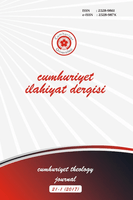
Cumhuriyet Ilahiyat Dergisi-Cumhuriyet Theology Journal
Fostering Critical Dialogue in the Academic Sphere.Cumhuriyet Ilahiyat Dergisi-Cumhuriyet Theology Journal is a distinguished peer-reviewed publication under the auspices of Cumhuriyet University, Faculty of Theology, based in Turkey. With an ISSN of 2528-9861 and an E-ISSN of 2528-987X, this open-access journal has been committed to advancing the scholarly discourse in the fields of Philosophy and Religious Studies since its inception in 2016. As part of a rapidly evolving academic landscape, the journal has achieved notable rankings, including Q3 in both Philosophy and Religious Studies, and Q4 in Social Sciences (miscellaneous) for 2023, indicating a growing impact in these disciplines. The journal aims to foster innovative research and critical dialogue, making it an essential resource for researchers, professionals, and students alike. With open access options, it ensures a wide dissemination of knowledge, amplifying the voices of scholars from diverse backgrounds and contributing significantly to the global academic community.

Nazariyat-Journal for the History of Islamic Philosophy and Sciences
Celebrating the Wisdom of Islamic Intellectual TraditionsNazariyat-Journal for the History of Islamic Philosophy and Sciences, published by SCIENTIFIC STUDIES ASSOCIATION, is a leading academic journal dedicated to the exploration and dissemination of research in the history of Islamic philosophy and sciences. With an ISSN of 2528-8563 and E-ISSN 2547-9415, this journal has adopted an Open Access model since 2014, ensuring that valuable insights and scholarly work are readily available to a global audience. Situated in Istanbul, Turkiye, the journal serves as a vital platform for researchers, students, and professionals seeking to deepen their understanding of the rich intellectual traditions of Islamic thought. Although the HIndex is currently unavailable, the journal is committed to upholding rigorous academic standards while encouraging interdisciplinary dialogue. By bridging historical examination with contemporary relevance, Nazariyat plays an essential role in fostering a nuanced appreciation of Islamic intellectual heritage within the broader scientific community.
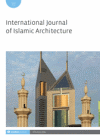
International Journal of Islamic Architecture
Exploring the Essence of Islamic Architectural HeritageThe International Journal of Islamic Architecture, published by INTELLECT LTD in the United Kingdom, is a pivotal scholarly resource dedicated to the exploration of Islamic architecture, design, and cultural expressions within a contemporary framework. With ISSN 2045-5895 and E-ISSN 2045-5909, this journal targets an interdisciplinary audience by bridging the gap between architecture, geography, urban studies, and the arts. Established in 2012, it has swiftly garnered recognition, achieving notable rankings such as Q3 in Architecture and Q2 in Visual Arts and Performing Arts by 2023. Although it currently does not offer open access, its articles are meticulously peer-reviewed, ensuring high academic standards and relevance. Emphasizing the significance of Islamic architectural heritage in global contexts, the journal seeks to foster innovative perspectives and critical discourse, making it an essential platform for researchers, professionals, and students alike to engage with contemporary architectural practices and cultural dialogues.

Al-Shajarah
Illuminating the Intersection of History, Philosophy, and IslamAl-Shajarah is an esteemed academic journal that serves as a vital platform for scholarly discourse in the fields of Cultural Studies, History, Philosophy, and Religious Studies. Published by the International Islamic University Malaysia and the International Institute of Islamic Thought and Civilization, the journal reflects a profound commitment to advancing understanding and dialogue surrounding Islamic thought and its place in modern society. With an ISSN of 1394-6870 and an evolving publication history since its convergence in 2011, Al-Shajarah offers valuable insights that cater to a broad array of readers, from seasoned researchers to emerging academics. The journal's rigorous peer-review process and commitment to cultural and religious scholarship are underscored by its categorization in the Q3 and Q4 quartiles in critical academic fields, and its Scopus rankings demonstrate its relevance within the global academic landscape. While open access is not currently available, Al-Shajarah remains a crucial resource for those seeking to enrich their understanding of Islamic civilizations and philosophy, providing access to pioneering research that shapes the conversation within these disciplines.

Al-Jamiah-Journal of Islamic Studies
Exploring the Depths of Islamic ThoughtAl-Jamiah: Journal of Islamic Studies is a distinguished scholarly journal published by Sunan Kalijaga State Islamic University in Indonesia. Established as an Open Access publication since 2005, it aims to foster the dissemination of knowledge in the field of Islamic studies, catering to a diverse audience of researchers, professionals, and students interested in the rich tapestry of Islamic culture, religion, and thought. With an impressive Q1 ranking in Religious Studies and a Q2 ranking in Arts and Humanities for 2023, the journal stands out as a vital resource with high visibility and impact, holding a prestigious position in Scopus ranks—40th out of 644 in Religious Studies and 12th out of 173 in General Arts and Humanities. Al-Jamiah's commitment to academic excellence is reflected in its rigorous peer-review process, ensuring the publication of high-quality research. Based in Yogyakarta, Indonesia, the journal welcomes contributions that explore innovative perspectives and interdisciplinary approaches to contemporary issues affecting the Islamic world.
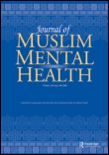
Journal of Muslim Mental Health
Championing Open Access to Transformative Mental Health ResearchJournal of Muslim Mental Health, an esteemed publication by MICHIGAN PUBLISHING, focuses on the intersection of mental health and Islamic perspectives. With an ISSN of 1556-4908 and an E-ISSN of 1556-5009, this journal has been championing open access since 2011, ensuring that valuable research is accessible to all. Covering a broad scope from 2007 to 2024, the journal has carved its niche within the fields of Clinical Psychology, Health (Social Science), Psychiatry, and Religious Studies, earning a Q3 ranking in both Clinical Psychology and Health, and a notable Q1 status in Religious Studies as of 2023. The Scopus Ranks indicate its growing influence, highlighted by its rankings in various categories. Whether you are a researcher, professional, or student, the Journal of Muslim Mental Health provides crucial insights and fosters dialogue on the mental health issues faced by Muslim communities, contributing significantly to both academic discourse and practical applications in mental health practices.

Hawwa
Fostering Interdisciplinary Dialogue on Society's Complexities.Hawwa is a distinguished academic journal published by BRILL, focusing on the intersections of culture, gender, and society. Established in the Netherlands, this journal has been a crucial platform for scholarly discourse since its inception in 2003. With an ISSN of 1569-2078 and an E-ISSN of 1569-2086, it serves as a vital resource for researchers and students alike, exploring the complexities of gender dynamics within various cultural contexts. In the rapidly evolving fields of Cultural Studies, Gender Studies, and Sociology and Political Science, Hawwa has achieved significant recognition, reflected in its 2023 Quartile Rankings (Q2 in Cultural Studies, Q3 in both Gender Studies and Sociology/Political Science) and commendable positions in the Scopus rankings. Although not an open-access journal, Hawwa maintains a commitment to fostering academic excellence and interdisciplinary dialogue, making it an essential read for those engaged in contemporary social theory and cultural analysis.

Afkar-Jurnal Akidah & Pemikiran Islam-Journal of Aqidah & Islamic Thought
Bridging Traditions and Innovations in Islamic StudiesAfkar-Jurnal Akidah & Pemikiran Islam-Journal of Aqidah & Islamic Thought is a premier academic journal published by University Malaya's Academy of Islamic Studies, dedicated to advancing the fields of Islamic thought and philosophy. Since its inception, it has rapidly gained recognition, achieving an impressive Q2 ranking in Philosophy and a Q1 ranking in Religious Studies as of 2023, reflecting its crucial contribution to scholarly discourse. With an increasing Scopus ranking, currently positioned at #187 out of 644 in Arts and Humanities - Religious Studies, it emphasizes the interdisciplinary nature of Islamic scholarship, catering not only to theologians but also to philosophers, sociologists, and cultural theorists. The journal welcomes articles that explore contemporary issues in Islamic thought while adhering to rigorous academic standards, providing a reflective platform for researchers, professionals, and students alike. Based in Kuala Lumpur, Malaysia, this journal operates under a commitment to open academic discourse, fostering an inclusive environment for groundbreaking research from various corners of the globe.
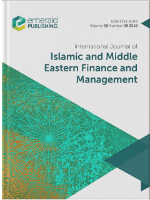
International Journal of Islamic and Middle Eastern Finance and Management
Unveiling Complexities in Islamic Finance and International Business.International Journal of Islamic and Middle Eastern Finance and Management, published by Emerald Group Publishing Ltd, stands as a pivotal platform for scholarly discourse within the fields of finance, management, and international business. Since its inception in 2008, the journal has continually contributed to the academic landscape, drawing attention from researchers and practitioners dedicated to understanding the complexities of Islamic and Middle Eastern financial systems. With an impressive Q2 ranking in 2023 across multiple categories—including Business and International Management, Finance, and Strategy and Management—the journal is recognized for its high-quality research, garnering a significant presence in Scopus rankings. While currently not an open-access journal, it offers comprehensive insights aimed at advancing theoretical and practical knowledge, making it an invaluable resource for students, professionals, and scholars alike. The journal's scope includes innovative studies that reflect the evolving dynamics of the global financial infrastructure, thereby fostering a deeper understanding of the intersection between culture and commerce.
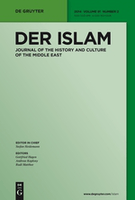
ISLAM-ZEITSCHRIFT FUR GESCHICHTE UND KULTUR DES ISLAMISCHEN ORIENTS
Advancing Scholarship in Islamic Cultural StudiesISLAM-ZEITSCHRIFT FUR GESCHICHTE UND KULTUR DES ISLAMISCHEN ORIENTS, with ISSN 0021-1818 and E-ISSN 1613-0928, is a prestigious academic journal published by Walter de Gruyter GmbH based in Germany. With a rich history dating back to 1910 and a dedicated focus on the cultural and historical insights of the Islamic Orient, this journal serves as a vital platform for scholars around the globe. It is recognized in the Q2 quartile in both Cultural Studies and History, reflecting its high-impact contributions to the field. The journal features rigorous peer-reviewed articles, making significant advancements in understanding Islamic culture and history. Notably, it holds commendable Scopus Ranks, placing it in the top 65th percentile for History and the 53rd percentile for Cultural Studies. Researchers, professionals, and students interested in the complexities of Islamic heritage will find this journal indispensable for its depth of analysis and breadth of scholarship. While it currently does not offer Open Access, its comprehensive resources are crucial for academic research in these historically rich fields.